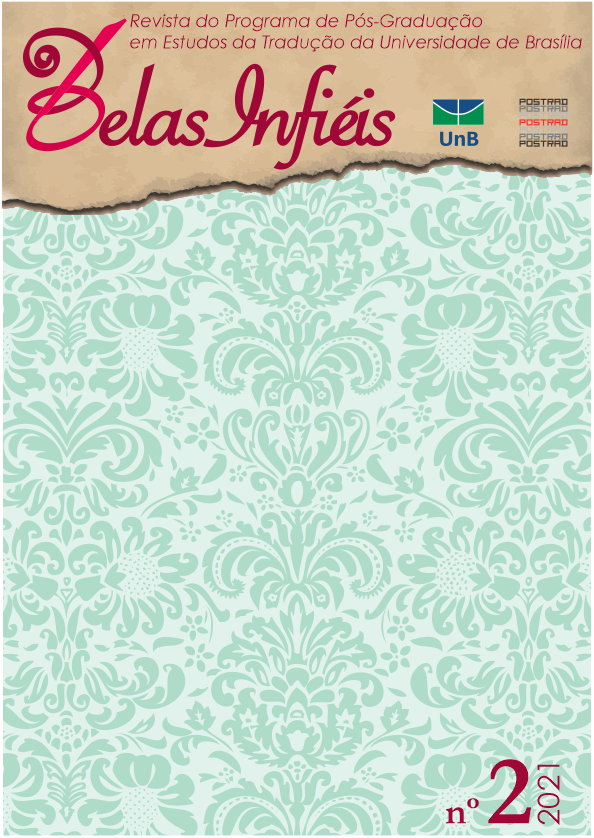Teaching the Metalanguage of Translation for Translation Learners as a Way of Promoting Self-Regulation
DOI:
https://doi.org/10.26512/belasinfieis.v10.n2.2021.29996Keywords:
Translation Didactics. Metacognition. Translation Competence. Learner autonomy. Teaching/Learning Materials.Abstract
This research aims to link the teaching of the metalanguage proper to translation in an introductory translation discipline to the promotion of self-regulatory learning behavior. The general objective is to discuss not only the role of metalanguage in promoting self-regulation in translation learners, but also how the systematized translation metalanguage teaching can contribute to the transition of other-regulation to self-regulation throughout the student's learning process. This paper explores the specific metalanguage linked to the notion of Translation Competence (TC) and its Acquisition (TCA) and to the concept of self-regulation. I start from the understanding that the teaching of metalanguage allows increasing the metacognitive processes, more specifically, the student's self-regulatory learning behavior. The theoretical basis is informed by the translation concept presented by Hurtado Albir (1999, 2005, 2015); as a methodological foundation, this work uses the concepts of other-regulation and self-regulation (Wertsch, 1979, 1985) and the notions of spontaneous and scientific concept (Vigotski, 2018). The teaching materials are based on cognitive-constructivist premises (Hurtado Albir, 2015), drawing methodologically upon the translation task-based learning, and the tasks being organized into Teaching Units (TU). This methodological approach was chosen because the tasks provide students with the necessary instruments for the acquisition of Translation Competence and are permeated by the specific metalanguage of translation. The present work highlights some of the results obtained after investigations carried out in one of the courses taught at the ‘Curso de Letras’- Universidade Federal de Santa Catarina (UFSC) dedicated to the teaching of translation. Those results suggest a relationship between the teaching of metalanguage and the development of the learners' metacognitive processes, particularly the promotion of self-regulation. The metalanguage teaching helped learners to reflect autonomously on the translation process they performed.
Downloads
References
Castellví, M. T. C. (2003). Theories of terminology: Their description, prescription and explanation. Terminology, 2(9), 163–199.
Delisle, J. (1993). La traduction raisonnée. Les Presses de l’Université d’Ottawa.
El Euch, S., & Huot, A. (2015). Strategies to develop metalinguistic awareness in adult learners. WEFLA 2015, International Conference on Foreign Languages, Communication and Culture, Holguin (Cuba), 1-12.
Neckel, F. M. (2019). Metalinguagem e autorregulação na formação de tradutores: uma proposta de disciplina e material didático sob a ótica da perspectiva cognitivo-construtivista de aprendizagem. [Tese doutorado, Universidade Federal de Santa Catarina]. http://tede.ufsc.br/teses/PGET0437-T.pdf
Gonçalves, J. L. (2015). Repensando o desenvolvimento da competência tradutória e suas implicações para a formação do tradutor. Revista Graphos, 17(1), 114-130.
Hurtado Albir, A. (1999). Enseñar a Traducir. Metodología en la formación de traductores e intérpretes. Edelsa.
Hurtado Albir, A. (2005). A aquisição da competência tradutória: aspectos teóricos e didáticos. In A. M. Pagano, C. Magalhães, & F. Alves (Eds.), Competência em tradução: cognição e discurso (pp. 19-57). Editora UFMG.
Hurtado Albir, A. (2007). Competence-based Curriculum Design for Training translators. The Interpreter and Translator Trainer, 1(2), 163-195.
Hurtado Albir, A. (2011). Traducción y traductología. Introducción a la traductología. Cátedra.
Hurtado Albir, A. (2015). Aprender a traducir del francês al español. Competências y tareas para la iniciación a la traducción. Edelsa.
Marco, J. (2009). The terminology of translation: Epistemological, conceptual and intercultural problems and their social consequences. In Y. Gambier, & L. van Doorslaer (Eds.), The Metalanguage of Translation (pp. 65-80). John Benjamins Publishing Company.
PACTE. (2000). Acquiring Translation Competence: Hypotheses and Methodological Problems in a Research Project. In A. Beeby, D. Ensinger, & M. Presas (Eds.), Investigating Translation (pp. 99-106). John Benjamins.
PACTE. (2005). Investigating Translation Competence: Conceptual and Methodological Issues. Meta, 50(2), 609-618.
Vigotski, L. S. (2018). A construção do pensamento e da linguagem. P. Bezerra (Trad.), 2ª ed. Editora WMF Martins Fontes.
Wertsch, J. V. (1979). From social interaction to higher psychological processes: A clarification and application of Vygotsky's theory. Human Development, 22(1), 1-22.
Wertsch, J. V. (1985). Vygotsky and the social formation of mind. Harvard University Press.
Downloads
Published
How to Cite
Issue
Section
License
Copyright (c) 2021 CC BY

This work is licensed under a Creative Commons Attribution 4.0 International License.
Given the public access to this journal, the texts are free to use but requires the recognition of the original authorship and initial publication in this journal to be properly stated.
 The journal allows the use of works published for non-commercial purposes, including the right to submit the work to publicly accessible databases. Published contributions are the sole and exclusive responsibility of the author(s).Â



















